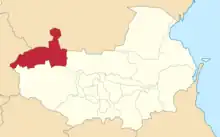Pyatigorsky otdel
The Pyatigorsky otdel[lower-alpha 1] was a Cossack district (otdel) of the Terek oblast of the Caucasus Viceroyalty of the Russian Empire. The area of the Pyatigorsky otdel makes up part of the North Caucasian Federal District of Russia. The district was eponymously named for its administrative center, Pyatigorsk.[1]
Pyatigorsky otdel
Пятигорскій отдѣлъ | |
|---|---|
 Location in the Terek Oblast | |
| Country | Russian Empire |
| Viceroyalty | Caucasus |
| Oblast | Terek |
| Established | 1785 |
| Abolished | 1924 |
| Capital | Pyatigorsk |
| Area | |
| • Total | 6,644.79 km2 (2,565.57 sq mi) |
| Population (1916) | |
| • Total | 200,486 |
| • Density | 30/km2 (78/sq mi) |
| • Urban | 40.75% |
| • Rural | 59.25% |
Administrative divisions
The subcounties (uchastoks) of the Pyatigorsky otdel were as follows:[2]
| Name | 1912 population |
|---|---|
| 1-y uchastok (1-й участокъ) | 43,052 |
| 2-y uchastok (2-й участокъ) | 27,072 |
Demographics
Russian Empire Census
According to the Russian Empire Census, the Pyatigorsky otdel had a population of 181,481 on 28 January [O.S. 15 January] 1897, including 93,961 men and 87,520 women. The majority of the population indicated Russian to be their mother tongue, with a significant Ukrainian speaking minority.[3]
| Language | Native speakers | % |
|---|---|---|
| Russian | 123,238 | 67.91 |
| Ukrainian | 25,032 | 13.79 |
| German | 5,872 | 3.24 |
| Ossetian | 4,620 | 2.55 |
| Armenian | 4,370 | 2.41 |
| Kabardian | 3,122 | 1.72 |
| Persian | 2,580 | 1.42 |
| Kalmyk | 2,174 | 1.20 |
| Circassian | 1,429 | 0.79 |
| Avar-Andean | 1,374 | 0.76 |
| Polish | 1,198 | 0.66 |
| Tatar[lower-alpha 2] | 1,120 | 0.62 |
| Belarusian | 1,026 | 0.57 |
| Nogai | 900 | 0.50 |
| Georgian | 775 | 0.43 |
| Jewish | 476 | 0.26 |
| Greek | 338 | 0.19 |
| Romani | 276 | 0.15 |
| Bashkir | 271 | 0.15 |
| Lithuanian | 264 | 0.15 |
| Karachay | 197 | 0.11 |
| Kumyk | 175 | 0.10 |
| Chechen | 80 | 0.04 |
| Kazi-Kumukh | 96 | 0.05 |
| Romanian | 53 | 0.03 |
| Imeretian | 40 | 0.02 |
| Ingush | 23 | 0.01 |
| Turkmen | 17 | 0.01 |
| Dargin | 11 | 0.01 |
| Other | 334 | 0.18 |
| TOTAL | 181,481 | 100.00 |
Kavkazskiy kalendar
According to the 1917 publication of Kavkazskiy kalendar, the Pyatigorsky otdel had a population of 200,486 on 14 January [O.S. 1 January] 1916, including 103,598 men and 96,888 women, 117,908 of whom were the permanent population, and 82,578 were temporary residents:[6]
| Nationality | Urban | Rural | TOTAL | |||
|---|---|---|---|---|---|---|
| Number | % | Number | % | Number | % | |
| Russians | 71,569 | 87.61 | 110,791 | 93.26 | 182,360 | 90.96 |
| Other Europeans | 3,969 | 4.86 | 6,952 | 5.85 | 10,921 | 5.45 |
| Armenians | 3,664 | 4.49 | 337 | 0.28 | 4,001 | 2.00 |
| North Caucasians | 1,201 | 1.47 | 432 | 0.36 | 1,633 | 0.81 |
| Georgians | 849 | 1.04 | 13 | 0.01 | 862 | 0.43 |
| Jews | 324 | 0.40 | 1 | 0.00 | 325 | 0.16 |
| Shia Muslims[lower-alpha 3] | 82 | 0.10 | 154 | 0.13 | 236 | 0.12 |
| Roma | 0 | 0.00 | 109 | 0.09 | 109 | 0.05 |
| Sunni Muslims[lower-alpha 4] | 31 | 0.04 | 0 | 0.00 | 31 | 0.02 |
| Asiatic Christians | 0 | 0.00 | 8 | 0.01 | 8 | 0.00 |
| TOTAL | 81,689 | 100.00 | 118,797 | 100.00 | 200,486 | 100.00 |
Notes
- Before 1918, Azerbaijanis were generally known as "Tatars". This term, employed by the Russians, referred to Turkic-speaking Muslims of the South Caucasus. After 1918, with the establishment of the Azerbaijan Democratic Republic and "especially during the Soviet era", the Tatar group identified itself as "Azerbaijani".[4][5]
- Primarily Tatars.[7]
- Primarily Turco-Tatars.[7]
References
- Tsutsiev 2014.
- Кавказский календарь на 1913 год, pp. 180–187.
- "Демоскоп Weekly - Приложение. Справочник статистических показателей". www.demoscope.ru. Retrieved 2022-07-09.
- Bournoutian 2018, p. 35 (note 25).
- Tsutsiev 2014, p. 50.
- Кавказский календарь на 1917 год, pp. 226–237.
- Hovannisian 1971, p. 67.
Bibliography
- Bournoutian, George A. (2018). Armenia and Imperial Decline: The Yerevan Province, 1900–1914. Milton Park, Abingdon, Oxon: Routledge. ISBN 978-1-351-06260-2. OCLC 1037283914.
- Hovannisian, Richard G. (1971). The Republic of Armenia: The First Year, 1918–1919. Vol. 1. Berkeley: University of California Press. ISBN 978-0520019843.
- Кавказский календарь на 1913 год [Caucasian calendar for 1913] (in Russian) (68th ed.). Tiflis: Tipografiya kantselyarii Ye.I.V. na Kavkaze, kazenny dom. 1913. Archived from the original on 19 April 2022.
- Кавказский календарь на 1917 год [Caucasian calendar for 1917] (in Russian) (72nd ed.). Tiflis: Tipografiya kantselyarii Ye.I.V. na Kavkaze, kazenny dom. 1917. Archived from the original on 4 November 2021.
- Tsutsiev, Arthur (2014). Atlas of the Ethno-Political History of the Caucasus (PDF). Translated by Nora Seligman Favorov. New Haven: Yale University Press. ISBN 9780300153088. Archived (PDF) from the original on 17 June 2023.